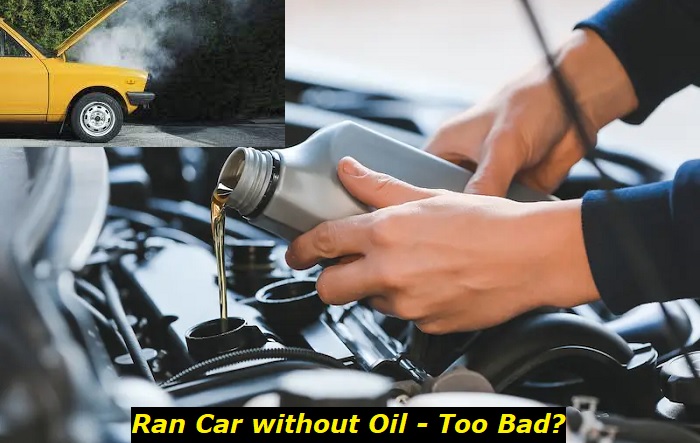When it comes to maintaining your car, one of the most important things to keep in mind is the oil level. Oil is essential for lubricating the moving parts of the engine, which helps to prevent friction and wear. Without it, the engine can quickly become damaged.
Oil-related issues highlights
- Level of urgency:high
- Average mileage:not related to mileage
- Repair cost:$0 - $1,900
- DIY repair:possible, in some cases
- Commonreasons:wrong oil, heavy oil consumption, leaks, engine problems
- Ifignored:fatal engine damage
- How to solve:use proper oil, check level regularly, solve issues withleaks

Can Running a Car Without Oil for a Few Seconds Damage the Engine?
The short answer is, it's possible. Running a car without oil can cause serious damage to the engine, and the longer the car runs without oil, the more severe the damage will be. But note that the amount of damage will also depend on other factors, such as the condition of the engine and how long it has been since the last oil change.
When an engine runs without oil, the moving parts inside the engine will begin to rub against each other without proper lubrication. This can cause friction and heat, which can damage the bearings, pistons, and other parts of the engine. If left unchecked, this damage can quickly become worse and may even lead to complete engine failure.
In some cases, the damage may be minimal and can be repaired with a simple oil change and a few other repairs. However, in more severe circumstances, the engine may need to be rebuilt or replaced.
Note that even if you only ran your car without oil for a short period, it's still important to have the engine inspected by a mechanic. Running a car without oil, even for a few seconds, can result in damage that may not be immediately apparent.
What to do if You Find Your Car without Oil
If you find your car without oil, take immediate action to avoid causing damage to your engine. Here are the steps you should take to address the situation:
- Stop driving: The first and most important step is to stop driving your car immediately. Continuing to drive your car without oil can cause heavy damage.
- Add oil to your car before turning on the engine: Once you have safely stopped your car, check the oil level using the dipstick. If the oil level is low, you will need to add oil to your car before you turn on the engine. Remember to use the correct type of oil for your car, which is typically specified in the owner's manual or on the oil filler cap.
- Take your car to a reliable mechanic:Even after adding oil to your car, you should take the vehicle to a reliable mechanic for a thorough inspection. The mechanic will identify any underlying issues that may have caused the oil leak, such as a damaged oil pan or a worn-out gasket. They will also check for any other potential problems that could cause damage to your engine.
What Causes Low Oil?
Understanding the causes of low oil makes it easier to prevent driving your car without oil. Here are a few to be mindful of:
- Irregular oil changes
One of the most common causes of low oil is neglecting to change your oil regularly. As the oil circulates through the engine, it picks up dirt and debris, which can cause the oil to become thick and dirty. This can cause the oil to lose its lubricating properties, leading to increased friction and wear on the engine. A regular oil change will help keep the oil clean and lubricate the engine properly.
- Leaks
Another common cause of low oil is leaks in the engine or oil system. These leaks can occur in the oil filter, oil pan, or oil pump, causing the oil to slowly leak out of the engine. Keep an eye out for any signs of leaks, such as a puddle of oil under your car or a burning oil smell, and have them repaired promptly.
- High oil consumption
Some cars naturally consume more oil than others, which can lead to low oil levels. If this describes your vehicle, check its oil level frequently and add oil as needed.
- Overfilling the oil
While it may seem counterintuitive, overfilling the oil can also lead to low oil levels. When the oil is overfilled, it can cause the oil to foam and aerate, leading to a loss of oil pressure and a drop in oil levels. So, check the oil level with a dipstick and only add the recommended amount of oil to your engine.
- Wear and tear
As your car ages, the engine components can wear out and cause low oil levels. This can include worn-out seals and gaskets, which can cause oil leaks, or worn-out bearings, which can cause increased oil consumption. Regular maintenance and inspections can help identify and address these issues early on.
How to Tell Your Car is Low on Oil
Driving a car without oil can have serious consequences, leading to costly repairs or even engine damage. That's why you should know the warning signs of low oil, so you can take action before it's too late.
1) Warning Light
The most obvious sign of low oil is the warning light on your dashboard. This light will turn on when the oil pressure is too low and can indicate a lack of oil or a problem with the oil pump. When this happens, pull over and check the oil level immediately. If the oil level is low, add more oil and have the vehicle inspected by a mechanic.
2) Knocking or Ticking Noises
Another sign that your oil is low is if you hear knocking or ticking noises coming from the engine. These noises are caused by the metal parts of the engine rubbing against each other, which can occur when there is not enough oil to lubricate the moving parts.
3) Smoke or Smell of Burning Oil
If you see smoke or smell burning oil while driving, it could be a sign that your oil is low. The smoke is caused by the engine overheating, and the smell of burning oil, by the oil burning off. If you notice either of these, pull over and check the oil level as soon as possible.
4) Reduced Performance
When there is not enough oil in the engine, expect a reduced performance including a decrease in power, acceleration, and fuel efficiency.
To prevent these warning signs from turning into major problems, regularly check your oil level and add oil as needed. It's also a good idea to have your oil changed at regular intervals as recommended by the manufacturer. Also, do so before embarking on a long trip. This is especially important for older cars which may consume more oil than new cars.
How to Know Your Engine is Damaged from No Oil
Oil is the lifeblood of an engine but unfortunately, many people do not pay attention to their oil levels and end up causing serious damage to their engines. We will discuss the signs that your engine is damaged from no oil and what you can do to prevent it. These are similar to the points mentioned as signs of a low oil level.
The first sign that your engine is damaged from no oil is a knocking or ticking noise coming from the engine. Another sign of an engine damaged from lack of oil is the engine producing a burning smell.
If you notice either of these signs, take your vehicle to a mechanic to diagnose the problem and advise you on the best course of action.
Additionally, keep an eye on the oil pressure light on your dashboard, which will tell you if the oil pressure is too low, indicating a potential problem.
Conclusion
Running a car without oil for even just 10 seconds can cause serious damage to the engine. The oil plays a crucial role in lubricating and cooling the moving parts of the engine, and without it, those parts can become damaged or worn down quickly.
If you suspect that you have run your car without oil, have a professional mechanic inspect the engine as soon as possible to assess the damage and determine the necessary repairs.
While it may be tempting to try to save money by skipping an oil change or neglecting to check the oil level, the cost of repairs from running the car without oil can end up being much more expensive in the long run. So, regularly check and maintain your oil level to ensure your vehicle's longevity and performance.
About the authors
The CarAraC research team is composed of seasoned auto mechanics and automotive industry professionals, including individuals with advanced degrees and certifications in their field. Our team members boast prestigious credentials, reflecting their extensive knowledge and skills. These qualifications include: IMI: Institute of the Motor Industry, ASE-Certified Master Automobile Technicians; Coventry University, Graduate of MA in Automotive Journalism; Politecnico di Torino, Italy, MS Automotive Engineering; Ss. Cyril and Methodius University in Skopje, Mechanical University in Skopje; TOC Automotive College; DHA Suffa University, Department of Mechanical Engineering






Add comment